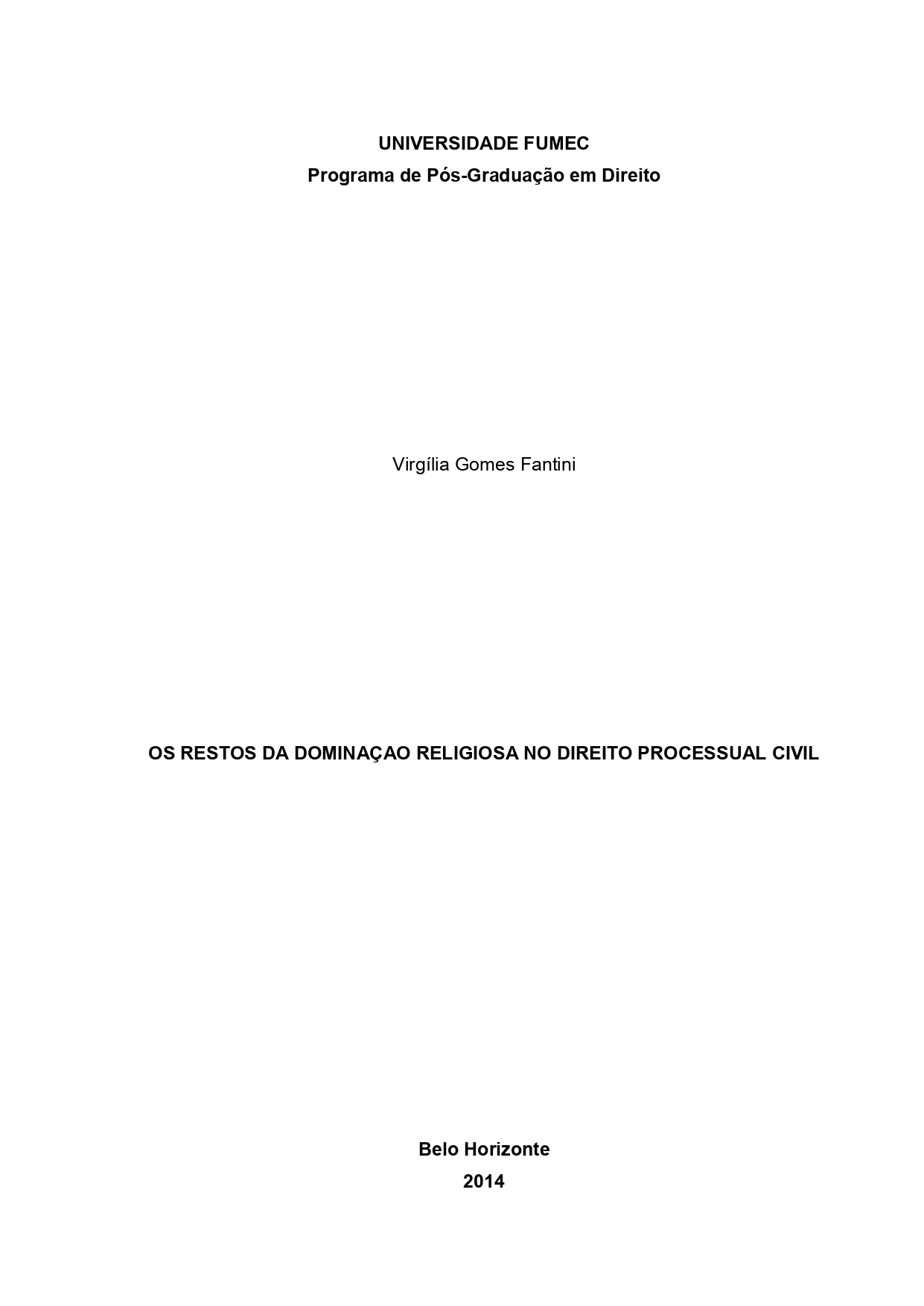Os restos da dominação religiosa no direito processual civil

Visualizar/
Data
2014Autor
Fantini, Virgília Gomes
xmlui.mirage2.itemSummaryView.MetaData
Mostrar registro completoResumo
O presente estudo representa um esforço de desvelamento do indizível que se
oculta num saber autoritário considerado, pela dogmática processual civil, como
indispensável à operacionalização do direito. Demonstra-se que essa dogmática
cuidadosamente proposta por um segmento do saber jurídico autônomo surgido no
final do Século XIX recebe e repete a herança religiosa do direito romano, e de onde
se retira seus modelos normativos. Objetiva-se, via contornos históricos, demonstrar
que a construção do direito processual moderno nasceu com suas raízes fincadas
em dogmas religiosos, tendo a figura mítica do sacerdote-juiz como único saber- poder de decidir. A partir deste mundo teocêntrico de sociedade, onde direito e
religião se tornaram lados de uma mesma moeda, inevitável que essa influência
mística alcançaria a prática judiciária, assim como a ritualística sagrada praticada em
cerimônias religiosas. Com isso, revela-se que o direito processual civil moderno
não se libertou dos pressupostos sacerdotais de revelação normativa, tais como o a
força simbólica presente na toga usada pelos magistrados, os rituais judiciários e a
autoridade mística de quem decide. A presente obra transita por autores como
Giorgio Agamben, René Girard, Antoine Garapon, Michel Foucault entre outros, com
o intuito de revelar a perene violência simbólica sacerdotal no poder-saber das
autoridades, que nos traz um direito processual atrelado à vontade moral e solipsista
do seu decisor. Por fim, defende o estudo, que a saída para a dominação jurídico-religiosa, ainda preconizada pela Ciência Dogmática do Direito, alcança-se por meio
de uma Teoria Neoinstitucionalista do Processo, criada pelo ilustre autor Rosemiro
Pereira Leal. Mostra-nos o autor, através de sua teoria, que somente por meio de
um médium linguístico-autocrítico-jurídico denominado processo,
constitucionalmente adotado por um Estado Democrático de Direito, poderemos
falsear saberes autoritários e impor uma fiscalidade irrestrita e aberta
processualmente a todos os participantes na construção do conjunto normativo para
uma sociedade assim considerada como democrática. This study aims to represent an effort in disclosing the unspoken, hidden in an
authoritarian knowledge considered by civil procedural dogmatic as essential to the
operationalization of law. It is shown that this dogmatic carefully proposed by a
segment of the autonomous legal knowledge arisen in the late nineteenth century
receives and repeats the religious heritage of Roman law, from where its normative
models are derived. The objective is to show that, via historical foundation, the
construction of the modern procedural law has its basement in religious dogmas, with
the mythical portrait of the priest-judge as the unique character to decide, based on
the dualism knowledge-power. From this theocentric world of society, where law and
religion resemble, this mystical influence would unavoidably reach judicial practice,
as well as sacred ritual practiced in religious ceremonies. Thus, it seems that the
modern civil procedural law has not disentangled from priestly assumptions of
normative revelation, such as the symbolic power in the toga worn by magistrates,
judicial rituals and the mystical authority for one to decide. This work contemplates
authors such as Giorgio Agamben, René Girard, Antoine Garapon, Michel Foucault
and others, in order to reveal the perennial sacerdotal symbolic violence in the
dualism power-knowledge of the authorities, which brings us a procedural law linked
to the moral and solipsistic will of its maker. Finally, the study argues that the
reasonable option for the legal-religious domination, still defended by the Dogmatic
Science of Law, can be reached through a Neoinstitutionalist Theory of Process,
created by renowned author Rosemiro Pereira Leal. Through his theory, the author
shows that only by means of a self-critical legal linguistic medium named process,
constitutionally adopted by a Democratic State of Law, one can distort authoritarian
knowledge and impose an unrestricted and open taxation procedurally to all
participants in the development of a set of rules for a society considered democratic
